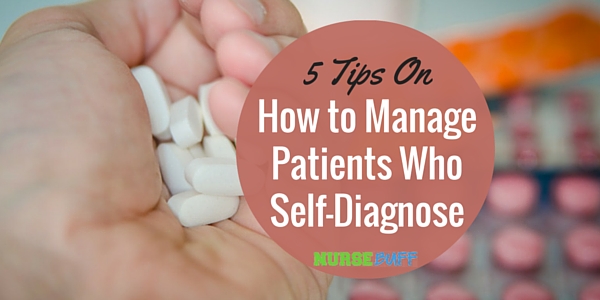Have you ever had to contend with patient self diagnosis?
A formal diagnosis is often the first step in the road to healing from a physical or mental disease. The right diagnosis can provide a healthcare provider with a clear roadmap to wellness. To obtain an accurate diagnosis, the patient is assessed, tested, and asked for relevant information.
In this day and age though, it’s very easy for folks to get on the Internet and do a research of their symptoms instead. Thus, it is common occurence to jump to a conclusion about one’s disease or sickness.
Why People Self-Diagnose

The top reasons why regular folks self-diagnose are the following:
• Reluctance to spend money
People who are feeling sick enough to consider getting help usually rely on the internet for clues and medical guidance because they either have no money to spend for their medical expenses or are simply reluctant to part with their hard-earned cash.
• Committed to other priorities
For some, getting sick is not an option. They might be committed to doing more important things like going to work or taking care of their families. For this reason, they hop online to diagnose their own diseases in order to save time and effort.
• Embarrassed about their health condition
Partly because of embarrassment about their conditions, one might not feel comfortable bringing up their symptoms with a healthcare provider. It may seem like a complete surrender of your privacy and may affect your self-confidence when disclosing sensitive health issues like bed wetting, persistent bad breath, sexually transmitted diseases, hemorrhoids, vaginal farting, peeing during sex, excessive sweating or acne breakouts.
Also Read: 30 Funniest Things Patients Say
Dangers of Self-Diagnosis

Self-diagnosis with the help of the internet or a simple Google search is fast, easy, and free. However, it can compromise one’s health especially if the diagnosis and management is wrong.
• Little learning can be dangerous
When patients self-diagnose and manage the disease alone, they may miss the subtleties that diagnosis and medical management constitute. The greatest perils of patient self-diagnosis often present in psychiatric disorders because you may miss a certain illness that masquerades as a psychiatric syndrome.
The two major dangers are:
– the patient’s condition progressing untreated
– side effects from self-medicating
• Patient self-diagnosis undermines the real doctor
Patients need to understand that if they doubt their doctor’s diagnosis, it’s alright to go to another specialist for a second opinion. However, trusting the word of an unknown person on the Internet especially when it comes to medication can put the patient in danger.
• Patient is in a state of denial despite symptoms
We’ve seen it too many times. We have friends or relatives who are afraid to face up to their possible health issues and avoid going to the doctor for a checkup. Instead, they rely on internet searches and settle for a diagnosis that they can handle.
For example, a patient can explain away fainting spells as anemia without running the needed lab tests. It is worse when others try to explain their symptoms away with superstition.
Also Read: How to Prevent Medication Errors: 12 Effective Tips for Nurses
Tips in Managing Patients Who Self-Diagnose

As a nurse, I already accepted the fact that self-diagnosis is now becoming a reality of working in a medical field. For patients who self-diagnose, establishing trust and rapport may be the most challenging part because we know for a fact that they are equipped with information that they obtained from the internet, books, or even from “word of mouth”.
Here are a few tips that can help you manage patients who self-diagnose.
1. Acknowledge their efforts
This is the first step to take when dealing with this kind of patients. As a healthcare provider, we put ourselves in someone else’s shoes to better understand what our patients are going through and to come up with a better solution. By simply acknowledging their valiant efforts that they have spent a lot of time researching about their symptoms, it makes them feel like they are given importance and are validated.
2. Encourage verbalization of feelings
Encouraging verbalization of feelings and listening to the patient helps establish trust and rapport which makes them much more likely to listen to you. It also helps you obtain significant information which might help you come up with a better potential diagnosis.
3. Build on what they have shared
Once you have a good grasp of what the patient believes and understands, there is a very high chance that you can get something relevant to their symptoms. If you can, it is best to build onto the information that they have shared with you and you can add more information about the same topic.
4. Suggest extra resources that can guide them
Providing patients with extra resources that can guide them may correct some of their false assumptions and provide them with more knowledge. Advise them to look for sites affiliated with academic medical centers or health care institutions. Often those sites thoroughly examine their content to provide the best and most accurate information to date. It is best to tell them to avoid sites heavily laden with advertising because the content in those sites sometimes are edited to meet certain requirements.
5. Educate them about the perils of self-diagnosis
As a health care provider, it is your medical obligation not only to conduct correct patient assessment and diagnosis but also to be a patient advocate. This means that it is part of your duty to educate patients with the pros and cons of self-diagnosis.
If possible, provide them with visual aids for them to have a better understanding of what they might experience if something goes unfavorably. In this way, they will minimize relying on the internet and other media to make a self-diagnosis.
Also Read: 10 Best Ways for Nurses to Educate Patients
Even though it can be frustrating when patients rely on the internet and resort to other modes of information to come up with a diagnosis, it also has a valuable side effect. Web-based symptom checkers are not that reliable, but sometimes they can help guide ill patients to the care they need. While recent advances in technology are now playing a major role in healthcare, it is still important to seek the aid of physicians and other healthcare providers with regards to accurate diagnosis.



















